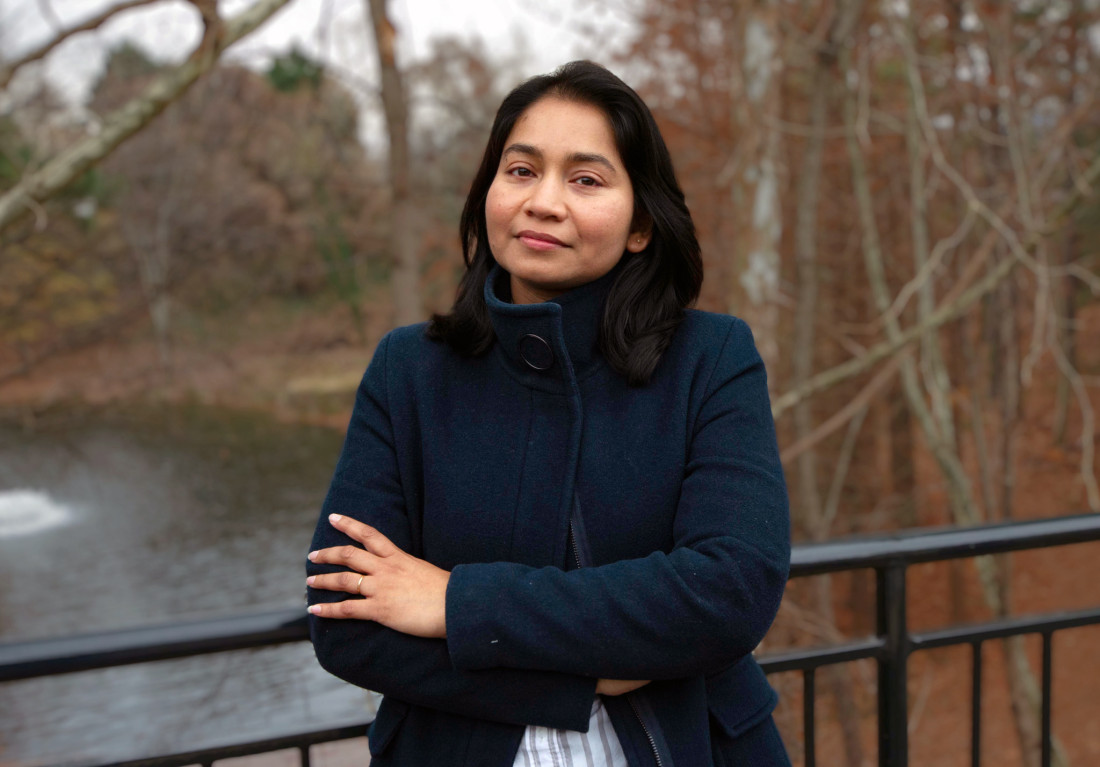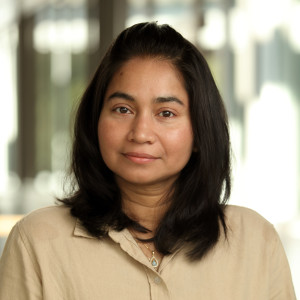Breaking the Code: Empowering Girls in Bangladesh to Bridge the Gender Gap in Tech

In an era when seemingly everyone has a smartphone and digital apps are streamlining our lives, we often overlook that the workforce behind technological innovation is still predominantly male. Gender inequalities in STEM careers — which are those relating to science, technology, engineering, and math — are a global issue.
Farhana Faruqe, an assistant professor of data science at the University of Virginia, has joined a growing movement that challenges gender norms in tech fields, starting in her home country of Bangladesh. Her mission intertwines coding and artificial intelligence education with empowering young girls in a society where career paths in these fields are often discouraged.
I recently met with Faruqe over a picnic table on a sunny but windy day outside our university’s hospital cafeteria. Under the shade of a crooked metal umbrella, she explained the premise behind creating her nonprofit, AI-for-Equity.
“I want to empower girls and women in Bangladesh through AI technology education,” Faruqe said. “By training women in AI applications and coding, we hope to improve their socioeconomic conditions while addressing inequalities in the tech field.”
Faruqe was born in Bangladesh and grew up in a family that valued education. The women in her family—her mother and aunts—were strong figureheads and role models for Faruqe and her sisters.
“I had a lot of opportunities, which were unusual in Bangladesh, especially for a girl,” Faruqe said. “I was very fortunate to have such strong role models at home, and my family supported my education and has always encouraged me.”
Faruqe studied computer science at BRAC, one of Bangladesh’s top universities, at a time when women made up less than 10% of the students in her major. After graduation, she secured a job as a software developer and moved to Trinidad, then later to Washington, D.C., where she worked as a project manager for a digital health care company.
Interested in continuing her education and learning about the emerging field of data science, she earned her master’s in data science and then a Ph.D. in human technology collaboration from George Washington University. It was while earning her doctorate that Faruqe began teaching and realized that she was both good at it and loved it.
The conspicuous lack of women working in the tech field and gender imbalance represented in her classrooms inspired Faruqe to launch AI-for-Equity. “I needed to do something,” she said.
Reaching out to a friend back home who worked at a private school for girls, Faruqe proposed a pilot afterschool program that introduced coding and AI concepts. In 2019 she held her first online class for nearly 20 girls.
“The courses are designed to be accessible for all,” said Faruqe. The program is for girls 15 years or older, and it does not require any previous technical knowledge.
Participants start off with familiar concepts and easy exercises. “We use MIT's Scratch—a playful initiation into computational logic—before delving into more complex coding languages like Python.” Her goal is to not only teach coding but instill confidence and inspire a passion for STEM fields.
“Women are underrepresented in the tech field globally,” explained Faruqe, and Bangladesh is way behind the global average. According to a 2020 UNICEF report, the global average of women who have foundational ICT skills—that is, the ability to understand and operate a wide range of technology software—is 26% compared to only 2% of women in Bangladesh. The global underrepresentation of women in STEM remains an ongoing issue, according to a 2023 Global Gender Gap Report. Data from 146 nations show women make up only 29.2% of the workforce, a marginal increase of just 1.58 percentage points in the last eight years. A gender imbalance remains.
Programs like AI-for-Equity hope to make an impact, one young woman at a time. Faruqe’s program not only introduces AI technology and skills but also includes a mentorship program and peer-to-peer collaboration between students in Bangladesh and the U.S. Her mission focuses on enhancing technical knowledge as well as creating cultural pathways and competencies.
In addition, she includes ethics in the curriculum, which is critical, according to Faruqe. “AI ethics is discussed throughout the courses to embed awareness of responsible AI in our students.”
The logistical challenges are palpable. Besides scheduling between a 12-hour time difference, students do not have personal laptops. Instead, they rely on their parents’ devices. Add in the nuanced dance of coordinating sessions with school hours and high-stakes exams, and Faruqe is amazed they’ve been able to meet monthly.
The original cohort of 20 girls has fluctuated over time, but the outcomes so far have been real and tangible. “Of those who have gone to university,” reported Faruqe, “at least 60% to 80% have decided to pursue STEM fields. That's phenomenal.”
Bushra Zaman is a former student of Faruqe, who described her as “very bright and smart,” someone who stepped up to assist in coordinating meetings and outreach to her classmates. Zaman and I set up a Zoom call one early morning—evening for her given the time difference—to talk about her experience in the program and its impact on her career aspirations.
Although the interview was just a voice call, I could hear how enthusiastic Zaman was to be speaking with me. In a girlish voice, she admitted this was her first time speaking with a foreigner and shared her love of horror movies.
When she first heard about the coding program offered by Faruqe, she was immediately interested. Zaham considers herself lucky to have parents that support her interest in technology. “They are proud to have a daughter interested in computer science,” she said, noting that is not the norm in Bangladesh. “Little girls are not encouraged to pursue science. They might study science in college (the equivalent of high school in the U.S.) but many end up getting married and don’t go on to university.”
She explained that after college, girls often get pregnant and need to support their child and family. “How can they get time off to learn programming?” she asked. “How do they even know about it? That’s the problem.”
Now in her second year of college, Zaman plans to attend university and study aerospace engineering. She hopes to one day work for a space program. Faruqe is incredibly proud of Zaham and counts her as one of many examples of what the AI-for-Equity program can achieve with motivated young Bangladeshi women.
Thinking ahead, Faruqe has a broader vision of the program, one that transcends borders and where data literacy is the new global currency.
“This larger vision is interesting,” she shared. “The low-income countries in the Global South are so far behind than countries like the United States. Technology is moving really fast, and the gap keeps getting wider.”
She explains that teaching data literacy can help people understand technology and AI at a general, informational level, which empowers everyone to understand how their data is being used. This in turn, she hopes, will inspire girls and young women to take an interest in AI, tech, and STEM fields. When asked how this can be done, Faruqe replied, “through smartphones.”
According to a report published by Statistica, the global smartphone penetration rate was estimated at 68% in 2022 with an estimated 6.3 billion smartphone subscriptions worldwide out of a global population of nearly 8 billion.
“Everyone has a cell phone,” said Faruqe. “So, start with something people are very familiar with like a smartphone and its applications.”
She proposes using Facebook as an example by explaining how when a photo is uploaded, an algorithm performs a facial recognition scan and will propose tagging individuals with existing profiles. “Show how AI is integrated into social media platforms, that it’s not just to improve the user experience but also raises privacy concerns,” explained Faruqe. “This is how you could teach data literacy.”
As we adjust to this new wave of technological and AI evolution, Faruqe is one example of the power and potential for change at the grassroots level. Her initiative, though modest in scale, reflects the global need for societal transformation and gender equity. From 7,600 miles away in Virginia, Faruqe is inspiring a future generation of Bangladeshi girls and young women, one line of code at a time.
“Anyone can promote quality education,” said Faruqe, “but it’s even more critical we do so in countries where women are underrepresented in STEM fields. After all, gender equity is a human right.”
